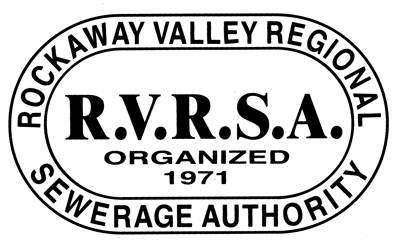IPP
IPP – Industrial Pretreatment
AN OVERVIEW
Historically, treatment plants, such as Rockaway Valley Regional Sewerage Authority were designed to treat domestic wastes only. However, in areas such as the one in which RVRSA provides service, industrial and commercial wastewater (non-domestic) is also received.
The purpose of having an industrial pretreatment program is to:
– Regulate the disposal of industrial and commercial wastewater into the sanitary wastewater collection system;
– Protect the physical structures and the safety of operation and maintenance personnel of the wastewater system;
– Protect the health and safety of the public and the environment;
– Achieve compliance with pretreatment regulations as required under the Federal General Pretreatment Regulations and Categorical Standards and local source control ordinances;
– Prevent illegal discharge of industrial pollutants into sanitary collection systems.
Protection of Treatment Facilities
Industrial wastewaters can cause damages to a treatment facility’s collection system by clogging the sewers, causing corrosion of the sewers and, can cause explosive atmospheres and other harm to the collection system. Industrial wastewater can all cause damage to the treatment facility by over-loading the system – hydraulically (high flows) or biologically (high organic wastes). And also, industrial wastewaters can damage the treatment facility by shocking the system, due to toxic wastewater – which can kill all the necessary organisms need to make the treatment plant process successfully.
Protection of the Community and the Environment
Pretreatment is not only aimed at protecting the treatment plant and personnel, but also the local community. For example, illegal dumping or accidental spills of gasoline, and other flammable liquids can create potential explosive atmospheres throughout the service area. Other examples include, odors, from certain chemical or industrial discharges can be a nuisance to the community as well as a health threat. And along with protecting our health and safety of our treatment plant and community, we have the environment. The final outfall of the treatment plant is the local river. If a pass through of a possible toxic chemical or industrial waste occurs at a treatment plant, it not only affects the plants ability to treat the wastes properly, but it can adversely affect the aquatic life which calls the local river home.
RVRSA program locates, permits, and regulates industries and commercial entities in our service area whom discharge into our treatment facility. Our program also inspects and samples industries who are permitted to discharge into our treatment collection system. And also allocates fines and penalties to any industry who violates their permit (industrial sewer connection permit) or RVRSA Service Rules and Regulations.
RVRSA currently regulates 14 Industrial Users (IU’s) by Industrial Sewer Connection Permits (ISCP’s). Three (3) are Categorical (have federal regulations), 5 Significant (discharge gallonage of over 100,000 gallons per day) and 6 Users of Concern. For a detailed breakdown of IU’s please download the IU list.
